The 24 Best Motivational Speeches Our Employees Have Ever Heard
It was halftime during one of my 7th-grade football games. And we were losing 14 - 0. With our knees planted in the grass, my team was quietly huddled, drenched in sweat and defeat. Suddenly, it was game over.

It was halftime during one of my 7th-grade football games. And we were losing 14 - 0. With our knees planted in the grass, my team was quietly huddled, drenched in sweat and defeat. Suddenly, it was game over. That's when our assistant coach burst into our circle and shattered our pity party, delivering one of the best motivational speeches I've heard to this day. I can't directly quote him because he said some inappropriate things for a blog post (and, in hindsight, probably for a bunch of 13-year-olds too). The point is he harnessed the power of words to rejuvenate a physically and emotionally drained team. And we came back clawing to win the game. A motivational speech can come from anywhere or anyone, but it usually has a specific audience in mind. Whether it's a graduation speech, an all-company meeting, a championship sporting event, or a conference keynote, these speeches are designed to change how their listeners see the challenges facing them in the future. Like in sports, being motivated at work is crucial for your performance. This rings especially true when you have a looming deadline, an important meeting, or colleagues or customers depending on your performance. Think about the last time you felt generally unmotivated. What brought you out of that feeling? Sometimes all it takes to get you going is a good night's sleep or witnessing the benefits of your labor. Still, other times, you might listen to someone say something that resonates with you — that alters how you've been looking at a particular task or problem. Motivational speeches and speakers can come in all different forms, but this is the one thing they have in common — resonance. They resonate with the right listener at the right time and in the right way. Who knows, this article is doing some for you right now. (I can dream, can't I?) We selected 24 of the best motivational speeches from business, sports, entertainment, and other fields to help you stay motivated no matter what your work throws at you. Watch these videos if you want to feel inspired by a project. Trust me, I was wiping my eyes after I saw them. And while the messages vary from speech to speech, they can put you in the optimal frame of mind for tackling and crushing your next big challenge. (Disclaimer: Some speeches may contain NSFW language.) Elon Musk: "The Importance of Never Giving Up" (2020) Angela Ahrendts: "Leading with Empathy" (2023) Arianna Huffington: "The Power of Sleep" (2023) Tim Cook: "Inclusion and Diversity" (2023) J.K. Rowling: “The Fringe Benefits of Failure, and the Importance of Imagination” (2008) Sheryl Sandberg: "Lean In" (2021) Jim Carrey: Commencement Speech at Maharishi University of Management (2014) Steve Jobs: "How to Live Before You Die" (2005) Matthew McConaughey: "The Pursuit of Happiness" (2022) Denzel Washington: "Fall Forward" (2011) Vera Jones: “But the Blind Can Lead the Blind…” (2016) Oprah Winfrey: "The Power of Self-Belief" (2020) Charlie Day: Merrimack College Commencement Speech (2014) Brené Brown: "The Power of Vulnerability" (2013) Kobe Bryant: “The Path to Greatness" (2020) David Foster Wallace: "This Is Water" (2005) Carol Dweck: "The Growth Mindset" (2020) Al Pacino: "Inch by Inch" (1999) Satya Nadella: "Empowering Others" (2023) Sylvester Stallone: Speech from Rocky Balboa (2006) Will Smith: Speech from The Pursuit of Happyness (2006) Mel Robbins: "The 5 Second Rule" (2020) Angela Duckworth: "The Power of Grit" (2020) Kurt Russell: “This is Your Time” (2004) Elon Musk's "The Importance of Never Giving Up" speech about perseverance and determination is decisive. In this speech, Musk emphasizes failing and learning from failures as keys to success. He recounts his life and career, demonstrating how he overcame challenges. One key takeaway from Musk's speech is his advice to adopt a growth mindset. Musk encourages listeners to view setbacks as learning experiences. He also highlights the value of perseverance, persistence, and taking risks. Elon Musk's word serves as an upbeat reminder that perseverance, patience, and the desire to attempt things repeatedly in the face of difficulty are essential for success. "If something is important enough, even if the odds are against you, you should still do it." The "Leading with Empathy" talk by Angela Ahrendts emphasizes the importance of emotional intelligence and compassion in leadership. According to Ahrendts, leaders must view their employees as whole people with lives outside of work. Leaders can instill trust, respect, and mutual support in their employees and organizations. Ahrendts emphasizes the importance of team mission as well. Leaders can inspire their teams by connecting them to a greater goal. She believes that working together fosters creativity, innovation, and growth. "Leading with Empathy" is a powerful reminder that leadership requires more than technical knowledge. To truly inspire and motivate their employees, leaders must understand their emotional needs and create a supportive, inclusive environment. "Empathy is the glue that holds relationships together, whether they are personal or professional." The Huffington Post's founder, Arianna Huffington, emphasized the importance of sleep to overall health. In her 2023 speech, "The Power of Sleep," she discusses how sleep deprivation affects our health, productivity, and happiness. Huffington observes that we have been taught to sacrifice sleep for success. She also mentions that well-rested employees are more creative, efficient, and effective. To address these issues, Huffington proposes a cultural shift that recognizes sleep as essential to health and wellness. She advises individuals and organizations to prioritize sleep, avoid technology before bedtime, and create a restful sleep environment. Sleep, according to Huffington, is a necessity, not a luxury. By recognizing the importance of sleep, people and businesses can enhance their health, productivity, and general well-being. Arianna Huffington's "The Power of Sleep" speech in 2023 emphasizes the importance of sleep and the dangers of sleep deprivation. It promotes a culture where getting enough sleep is essential for health and well-being. "Sleep is the Swiss Army knife of health, it does everything." Apple CEO Tim Cook advocates for inclusion and diversity. He has been instrumental in the company's initiatives to advance fairness and equality inside its ranks and across the technology sector. Cook has prioritized diversity and inclusion at Apple because he believes it is proper and necessary for innovation and business success. Unconscious bias training, diverse recruitment, and employee resource groups contributed to his success. Outside of Apple, Cook has advocated for LGBTQ+ rights and immigration reform. He has raised awareness of these issues and advocated for social change as a business leader. Tech leaders and others have lauded Cook's commitment to diversity and inclusion. He has raised awareness of these issues, leading to significant change at Apple and elsewhere. "Inclusion and diversity are not just buzzwords, they are fundamental values that drive innovation and creativity." In J.K. Rowling's 2008 Harvard commencement speech, the Harry Potter author explored how two phenomena -- failure and imagination -- can be crucial to success. While failure can help you understand where your true passion lies, and where you should focus your energy moving forward, imagination is what will allow you to empathize with other people so you can use your influence to do good. “We do not need magic to change the world, we carry all the power we need inside ourselves already: we have the power to imagine better.” "You have to understand your own personal DNA. Don't do things because I do them or Steve Jobs or Mark Cuban tried it. You need to know your personal brand and stay true to it." Sheryl Sandberg's 2021 talk, "Lean In," encourages women to lean into their careers and leadership roles. She urges women to stand up for one another and themselves to overcome societal and cultural hurdles. Sandberg highlights the need to have distinct objectives and goals and be prepared to take calculated risks to achieve them. She also underlines how crucial it is for more female leaders to advance diversity and gender equality across all industries. Sandberg's speech also emphasizes collaboration. She urges women to mentor other women and look for sponsors and mentors themselves. The "Lean In" talk by Sheryl Sandberg emphasizes women's voices and perspectives in all aspects of society. To remove barriers and foster more inclusive and varied workplaces and communities, Sandberg urges women to pursue their professional ambitions with confidence and with the help of their communities. "We need women at all levels, including the top, to change the dynamic, reshape the conversation, to make sure women's voices are heard and heeded, not overlooked and ignored." Jim Carrey might make a living as the goofiest comedian around, but in 2014, he combined classic Carrey humor with unforgettable insight at Maharishi University of Management's graduation ceremony. Jim Carrey opened his speech dishing punchlines, but he eventually opened up about his upbringing and the role fear plays in our lives. You can actually hear the amazement in the students' reactions in the video above. “I learned many great lessons from my father -- not the least of which is that you can fail at what you don't want, so you might as well take a chance on doing what you love.” Considering the YouTube video of Steve Jobs' 2005 Stanford commencement speech has 24 million views, it's likely that you've seen this one already. In the speech, Jobs plays on two themes: connecting the dots (anecdote: how taking a calligraphy class helped inspire the design of the Mac) and love & loss (anecdote: how getting fired from Apple helped inspire his greatest innovations). Perhaps the most memorable part his speech comes at the end, when he quotes the (now-famous) lines from the final issue of his favorite publication, The Whole Earth Catalog: “Stay hungry. Stay foolish.” In "The Pursuit of Happiness," famed actor and motivational speaker Matthew McConaughey provides his enlightened viewpoint on obtaining true happiness and fulfillment. McConaughey presents a genuine and approachable study of what it means to live a fulfilling life through sincere storytelling and personal anecdotes. The speech discusses the significance of authenticity and remaining true to oneself. McConaughey encourages people to define their success rather than succumb to social pressures or external expectations. He stresses aligning our behaviors and decisions with our fundamental values and passions. McConaughey expresses his conviction in the power of thankfulness and the importance of living in the present moment. He encourages people to create a grateful mindset, recognizing the blessings and possibilities surrounding them. By appreciating the present and finding joy in the journey, individuals can experience more profound happiness and fulfillment. "Happiness is not a destination. It's a state of mind, a journey, and a choice we make every day." In his 2011 UPenn commencement speech, Denzel Washington highlighted three reasons why we need to embrace failure in order to be successful. First, everybody will fail at something at some point, so you better get used to it. Second, if you never fail, take that as a sign that you're not really trying. And third, at the end of the day, failure will help you figure out what path you want to be on. “Fall forward. Here's what I mean: Reggie Jackson struck out twenty-six-hundred times in his career — the most in the history of baseball. But you don't hear about the strikeouts. People remember the home runs. Fall forward. Thomas Edison conducted 1,000 failed experiments. Did you know that? I didn't know that—because #1,001 was the light bulb. Fall forward. Every failed experiment is one step closer to success.” Last year at INBOUND, Vera Jones told a moving story about the life lessons she's learned from raising her blind son. She explains how having faith in your future and letting it lead you toward your true purpose will help you overcome blinding obstacles. She also discusses how following your passion and trusting your vision develops empathy, which is a critical leadership skill. “Passionately play your position no matter how bad things get. You are significant. Why we are here is not for our own glory. Ultimately, we're here to lead and serve everybody else. By doing that, we encourage others to do the same.” Theme of Speech: Self-Belief and Confidence Oprah Winfrey's 2020 speech "The Power of Self-Belief" emphasized the importance of self-assurance. She attributed her success to her unwavering self-assurance. According to Oprah, self-belief is not about being arrogant or overconfident. She stresses the significance of overcoming self-doubt and fear, which can prevent people from reaching their goals. Oprah used personal stories to demonstrate how self-confidence has aided her in life and work. She encouraged her audience to believe in themselves and to embrace their inner strength. The Power of Self-Belief" reminded us how important it is to have faith in ourselves and our ability to succeed. "The biggest adventure you can ever take is to live the life of your dreams." Best known for his role in the sitcom It's Always Sunny in Philadelphia, actor Charlie Day had lots of wisdom to share during the 2014 commencement speech at his alma mater, Merrimack College. Day explained to the audience how college degrees are inherently valueless, since you can't trade them in for cash. Instead, it's you, your hard work, and the risks you take that provide real value in life. “You cannot let a fear of failure or a fear of comparison or a fear of judgment stop you from doing the things that will make you great. You cannot succeed without the risk of failure. You cannot have a voice without the risk of criticism. You cannot love without the risk of loss. You must take these risks.” The video above is an animated excerpt from researcher Brené Brown's speech, "The Power of Vulnerability." In the speech, Brown explores how our fear of not being good enough (among other fears) drives us to shield ourselves from our own vulnerabilities. The alternative to wearing this emotional suit of armor: Embrace vulnerability through empathizing with others. "Empathy is a choice, and it's a vulnerable choice. Because in order to connect with you, I have to connect with something in myself that knows that feeling." Bryant emphasizes setting ambitious goals and working tirelessly to achieve them. Through captivating storytelling and personal anecdotes, he reveals the sacrifices and relentless effort required to excel at the highest level. Bryant's speech is a testament to the power of hard work, discipline, and a growth mindset in attaining greatness. The speech also explores embracing failure as a stepping stone to success. Bryant shares how setbacks and challenges can fuel personal growth and resilience. He encourages individuals to embrace failure, learn from it, and use it as motivation to push beyond their limits. Bryant's speech goes beyond the realm of sports, offering valuable insights and life lessons applicable to all areas of life. His relentless pursuit of greatness and unwavering commitment to excellence inspires individuals striving to achieve their goals and dreams. "I have self-doubt. I have insecurity. I have fear of failure. I have nights when I show up at the arena and I'm like, 'My back hurts, my feet hurt, my knees hurt. I don't have it. I just want to chill.' We all have self-doubt. You don't deny it, but you also don't capitulate to it. You embrace it." From the opening minutes of David Foster Wallace's 2005 Kenyon College commencement speech, in which he questions commencement speech conventions, it's clear that Wallace has some serious wisdom to share. The crux of his speech: Many of us are oblivious to our own close-mindedness. We picture ourselves as the centers of our own, individual universes, instead of seeing the bigger, more interconnected picture. “If you're automatically sure that you know what reality is and who and what is really important, if you want to operate on your default setting, then you, like me, probably won't consider possibilities that aren't annoying and miserable. But if you've really learned how to think, how to pay attention, then you'll know you have other options. It will actually be within your power to experience a crowded, hot, slow, consumer hell-type situation as not only meaningful, but sacred — on fire with the same force that lit the stars: love, fellowship, the mystical oneness of all things deep down.” In "The Growth Mindset," Carol Dweck, a renowned psychologist, and author, delivers an enlightening speech on the power of adopting a growth mindset for personal and professional growth. Dweck's extensive research on mindset and achievement provides the foundation for her impactful message. Dweck explains the difference between a fixed mindset, where individuals believe their abilities are fixed traits, and a growth mindset, where individuals believe their abilities can be developed through effort and learning. She demonstrates how a growth mindset fosters resilience, learning, and innovation through relatable stories and compelling examples. Dweck's speech resonates with individuals seeking personal and professional development, as she provides insights into how adopting a growth mindset can positively impact all areas of life. Her research-based approach and engaging speaking style make "The Growth Mindset" an inspiring resource for individuals striving for continuous growth and improvement. "The passion for stretching yourself and sticking to it, even when it's not going well, is the hallmark of the growth mindset." Yes, this speech is from a football movie (Any Given Sunday), but trust me: This isn't your stereotypical rah-rah-go-get-'em sports speech. It's deeper than that. It's about life, and loss, and ... gosh darn it just listen to Al Pacino. He's pouring his soul out! “Either we heal as a team or we're gonna crumble, inch by inch, play by play, till we're finished. We're in hell right now, gentlemen, believe me. And we can stay here and get the $&#@ kicked out of us, or we can fight our way back into the light. We can climb out of hell, one inch at a time.” Theme of the Speech: Empowerment and Collaboration Satya Nadella's 2023 lecture, "Empowering Others," emphasizes the importance of leadership that empowers others rather than focusing on personal success. He emphasizes the importance of leaders cultivating a culture of inclusion and belonging in which everyone feels respected and able to accomplish their best work. Nadella also discusses the significance of technology in positive development. Some of society's most important issues may be resolved by technology, but proper development and application are required. According to Nadella, empathy and emotional intelligence are essential for outstanding leadership. He suggests that Leaders listen to and understand. their team members' needs and motivations. Leaders can develop a culture of trust and collaboration that will help the team flourish. Satya Nadella's "Empowering Others" provides a special message about leadership in the current day. By emphasizing diversity, empathy, and responsible innovation, Nadella encourages audiences to strive for excellence while being mindful of their impact on others and the world. "Success is not just about what we achieve individually, but what we enable others to achieve." I had to put this one next since it plays along the same themes as Denzel Washington's UPenn speech. In the scene above, from the 2006 film Rocky Balboa, the title character (played by Sylvester Stallone) is having a heart-to-heart with his son. The advice he gives him: Don't let your failures or the adversity you face slow you down. Keep. Moving. Forward. “Let me tell you something you already know. The world ain't all sunshine and rainbows. It's a very mean and nasty place, and I don't care how tough you are, it will beat you to your knees and keep you there permanently if you let it. You, me, or nobody is gonna hit as hard as life. But it ain't about how hard you hit. It's about how hard you can get hit and keep moving forward. How much you can take and keep moving forward. That's how winning is done!” Here's another speech from the big screen, this time from the 2006 film The Pursuit of Happyness. In the scene above, Will Smith's character explains to his son why he shouldn't pursue basketball (because he'll end up being "below average") before having a major change of heart. “Don't ever let somebody tell you ... you can't do something. Not even me. All right? You got a dream. You gotta protect it. People can't do something themselves, they want to tell you can't do it. If you want something, go get it. Period.” Theme of the Speech: Action and Overcoming Self-Doubt The "The 5 Second Rule" speech by Mel Robbins promotes action to achieve goals and overcome concerns and doubts. When confronted with a decision or action that needs to be completed but you are hesitating or procrastinating, countdown from 5, and then act. According to Robbins, this method breaks habit loops that keep us unhealthy. Counting down and taking action may assist us in overcoming uncertainty and self-doubt and moving toward our objectives. For success, Robbins also promotes mentality and self-talk. She believes that to realize our potential, we must consciously reframe negative thoughts and limiting beliefs. Mel Robbins' presentation "The 5 Second Rule" is a practical and efficient technique to overcome procrastination and achieve goals. Robbins inspires listeners to take command of their lives and achieve by emphasizing attitude, self-talk, and positive actions. "You are never going to feel like doing the things that are tough, difficult, or uncertain, but you have a choice." Theme of the Speech: Spirit and Perseverance Angela Duckworth examines the significance of perseverance and resilience in achievement in her book "The Power of Grit." According to Duckworth, grit—passion and determination—is essential for long-term success and overcoming obstacles. Duckworth addresses grit and mentality, believing that people who view challenges and setbacks as opportunities for growth rather than threats will develop resilience and determination over time. She advocates for a growth mindset, which believes people can acquire intelligence and other qualities through hard work. Duckworth places a premium on rigorous practice to achieve skill and mastery. She recommends soliciting feedback, setting challenging goals, and intentionally improving abilities and succeeding. Angela Duckworth's "The Power of Grit" illuminates long-term achievement. Duckworth emphasizes attitude, focused practice, and resilience to urge listeners to acquire grit and pursue their passions with tenacity. "Grit is passion and perseverance for very long-term goals. Grit is having stamina. Grit is sticking with your future, day in, day out, not just for the week, not just for the month, but for years, and working really hard to make that future a reality." The Miracle on Ice is still considered the biggest upset in Olympic hockey history. And for good reason. The Soviet Union won six of the last seven Olympic gold medals, and the U.S. team consisted only of amateur players. It was obvious the Soviets were better. But, in the movie Miracle, which told the incredible story of the 1980 U.S. Olympic Hockey Team, Kurt Russell's character — Coach Herb Brooks — knew that this game was different. The U.S. was better than the Soviets that day. And his speech conveyed such a strong belief in his team that they pulled off one of the greatest sports moments of the 20th century. “If we played 'em ten times, they might win nine. But not this game… Not tonight. Tonight, we skate with them. Tonight, we stay with them. And we shut them down because we can! Tonight, WE are the greatest hockey team in the world. You were born to be hockey players, every one of you. And you were meant to be here tonight. This is your time.”
Motivational Speech
The Best Motivational Speeches of All Time
1. Elon Musk: "The Importance of Never Giving Up" (2020)
Theme of Speech: Perseverance and Resilience
2. Angela Ahrendts: "Leading with Empathy" (2023)
Theme of the Speech: Empathetic Leadership...
3. Arianna Huffington: "The Power of Sleep" (2023)
Theme of the Speech: Sleep and Productivity
4. Tim Cook: "Inclusion and Diversity" (2023)
Theme of the Speech: Inclusion and Diversity
5. J.K. Rowling: “The Fringe Benefits of Failure, and the Importance of Imagination” (2008)
Theme of Speech: Failure
6. Sheryl Sandberg: "Lean In" (2021)
Theme of the Speech: Gender Equality and Leadership
7. Jim Carrey: Commencement Speech at Maharishi University of Management (2014)
Theme of Speech: Taking Risks
8. Steve Jobs: "How to Live Before You Die" (2005)
Theme of Speech: Life and Career
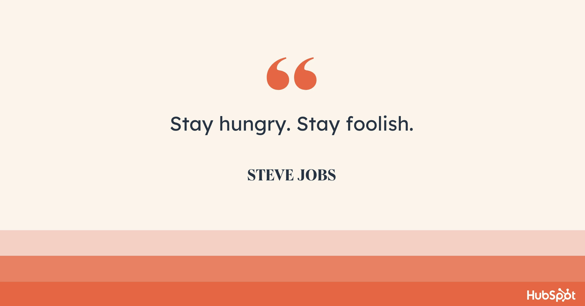
9. Matthew McConaughey: "The Pursuit of Happiness" (2022)
Theme of the Speech: Discovering True Happiness and Fulfillment in Life.
10. Denzel Washington: "Fall Forward" (2011)
Theme of Speech: Failure
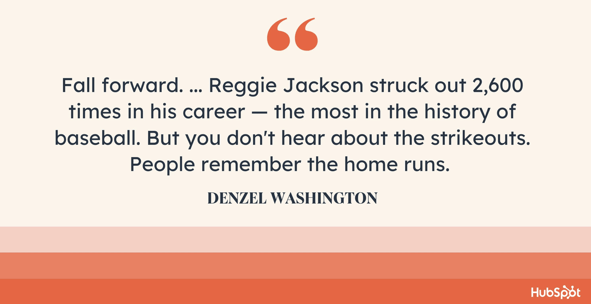
11. Vera Jones: “But the Blind Can Lead the Blind…” (2016)
Theme of Speech: Perseverance
12. Oprah Winfrey: "The Power of Self-Belief" (2020)
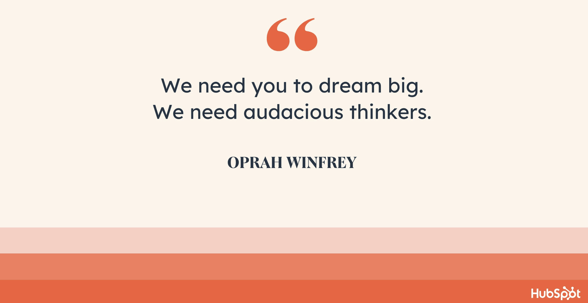
13. Charlie Day: Merrimack College Commencement Speech (2014)
Theme of Speech: Taking Risks
14. Brené Brown: "The Power of Vulnerability" (2013)
Theme of Speech: Failure
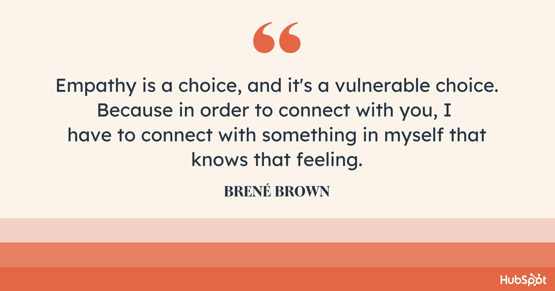
15. Kobe Bryant: “The Path to Greatness" (2020)
Theme of the Speech: Embracing Dedication, Perseverance, and a Relentless Pursuit of Greatness.
16. David Foster Wallace: "This Is Water" (2005)
Theme of Speech: Life and Career
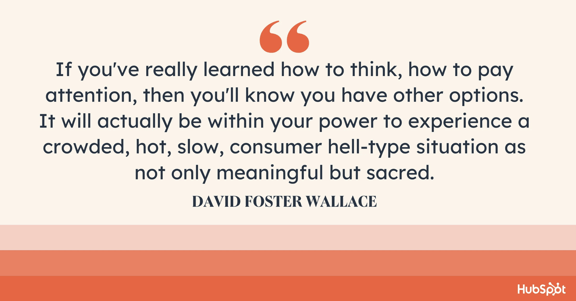
17. Carol Dweck: "The Growth Mindset" (2020)
Theme of the Speech: Cultivating a Growth Mindset for Personal and Professional Development.
Famous Short Speeches With Inspirational Takeaways
18. Al Pacino: "Inch by Inch" (1999)
Theme of Speech: Teamwork
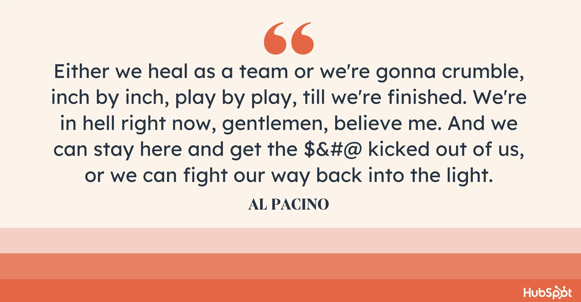
19. Satya Nadella: "Empowering Others" (2023)
20. Sylvester Stallone: Speech from Rocky Balboa (2006)
Theme of Speech: Never Give Up
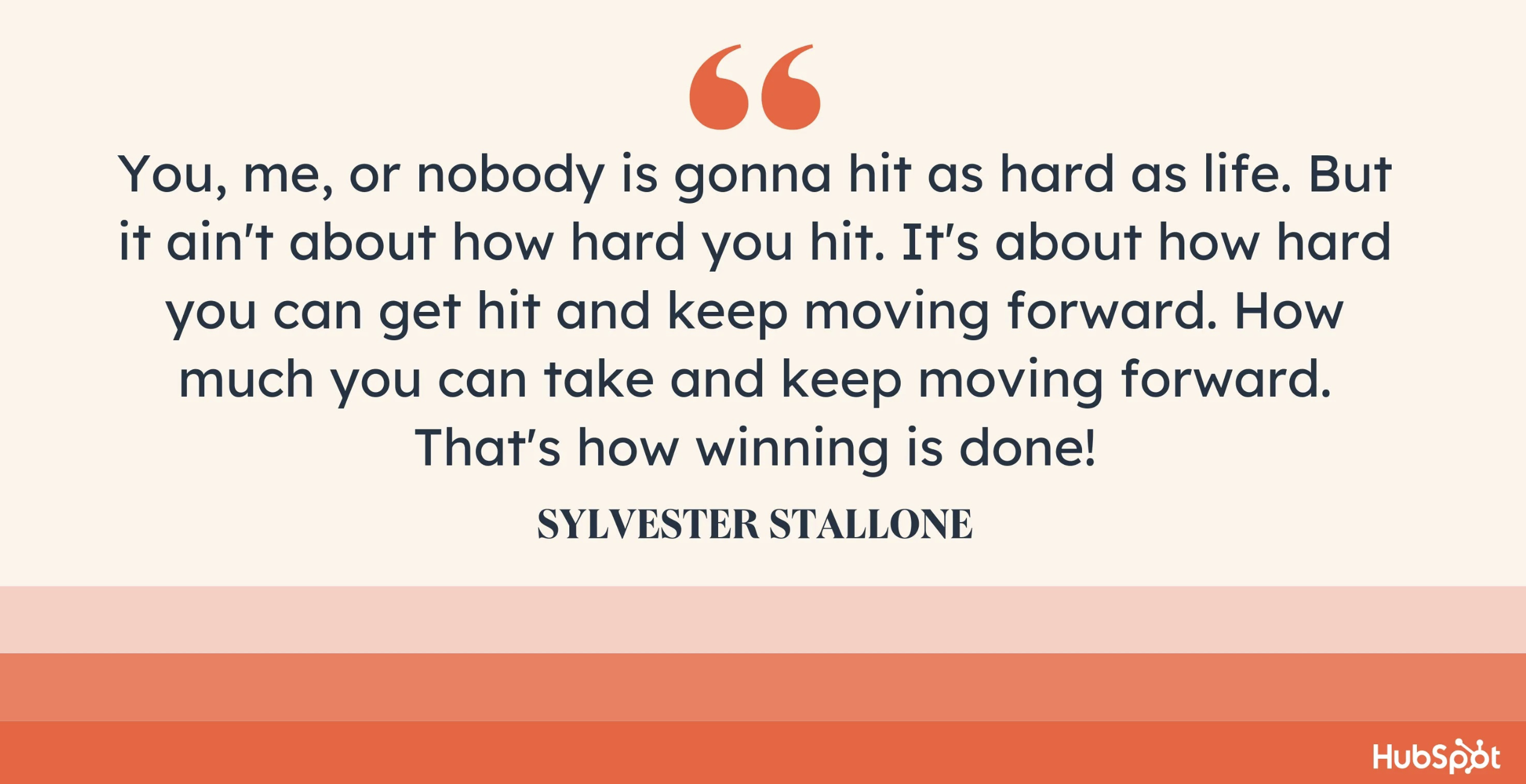
21. Will Smith: Speech from The Pursuit of Happyness (2006)
Theme of Speech: Don’t Let Them Bring You Down
22. Mel Robbins: "The 5 Second Rule" (2020)
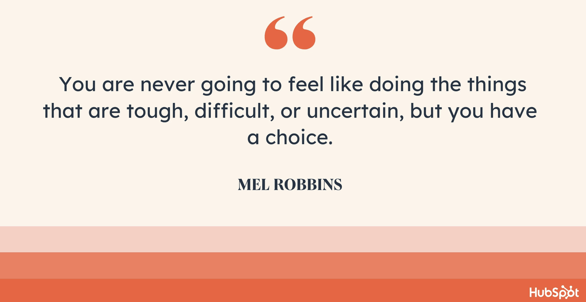
23. Angela Duckworth: "The Power of Grit" (2020)
24. Kurt Russell: “This is Your Time” (2004)
Theme of Speech: Inspiring and Believing in Your Team
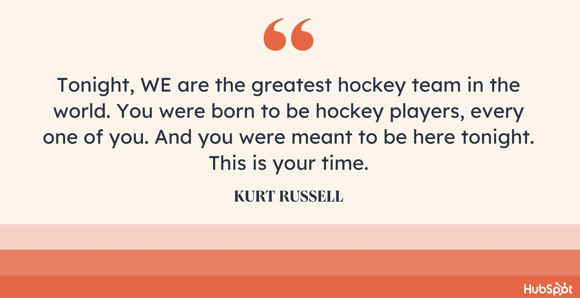 Want more? Read How to Motivate Yourself When You're Absolutely Exhausted.
Want more? Read How to Motivate Yourself When You're Absolutely Exhausted.

 Tfoso
Tfoso ![→ Click here to download leadership lessons from HubSpot founder, Dharmesh Shah [Free Guide].](https://no-cache.hubspot.com/cta/default/53/4e634041-e1ce-4a85-8e65-aea12fc10b84.png)











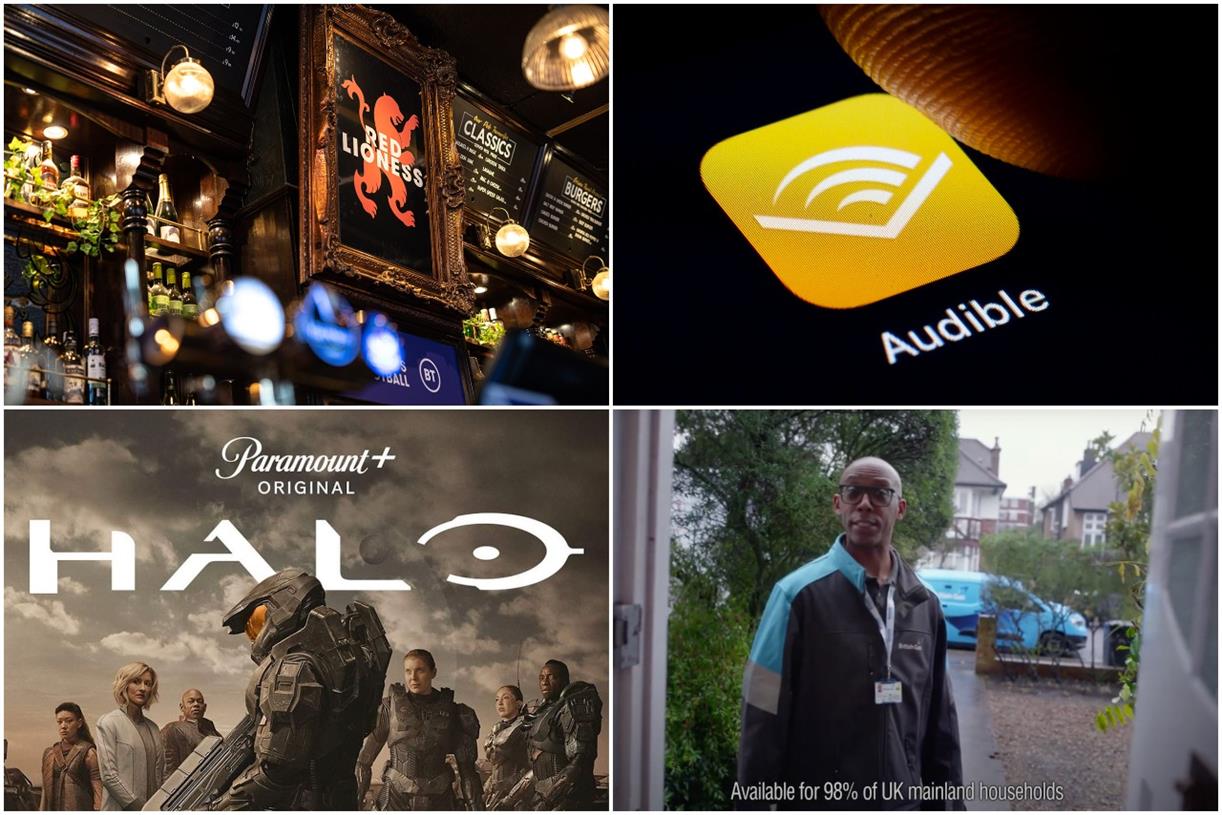
![How to Write a Great Email Signature [+ Professional Examples]](https://blog.hubspot.com/hubfs/email-signatures-1.jpg#keepProtocol)


















